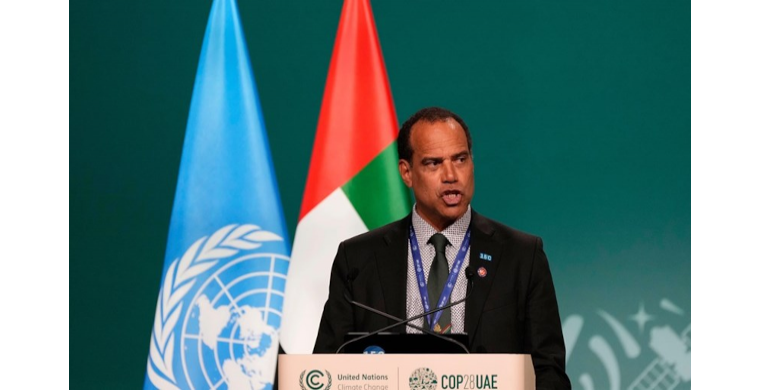Rising seas could cause displacement, Anglican Primate at COP28 warns
The Climate Change Minister of Vanuatu, Ralph Regenvanu, speaks during a plenary session at COP28, on Saturday
By Joe Ware in Dubai
CHURCH TIMES
December 11, 2023
AS THE COP28 climate summit entered its final hours, the Primate leading the Anglican Communion presence at the meeting has warned that, without action to tackle the climate crisis, people living in low-lying islands will be entirely displaced from their homes.
The Primate of Central America, the Most Revd Julio Murray, from Panama, met people who are facing an existential threat from rising seas. He said: "I had a wonderful conversation with representatives from Vanuatu, an island in the Pacific. They have been coming to the COPs for many years, and their level of frustration and concern was brought to our attention.
"We heard from the Prime Minister of Barbados, Mia Mottley, how important it is for action to be taken so that island countries will have the help and resources to be transferred to safer lands and safer places."
Archbishop Murray said that the delegates from Vanuatu urged him to encourage more organisations to call for the creation of a Fossil Fuel Non-Proliferation Treaty, which the Anglican Communion adopted earlier this year. This week, the Pacific Island of Nauru became the latest nation state to sign up to the treaty proposal, which is modelled on the nuclear non-proliferation treaty.
Nauru joins a growing bloc of countries -- Vanuatu, Tuvalu, Tonga, Fiji, Niue, the Solomon Islands, Antigua and Barbuda, Timor-Leste, Palau, Colombia, and Samoa -- that are pushing to secure a mandate to negotiate a new international mechanism to manage the phasing out of fossil fuels, and finance a global transition away from oil, gas, and coal.
Speaking at COP28, the Climate Change and National Resilience Secretary of Nauru, Reagan Moses, said: "We are ready to do our part in making the Pacific a fossil fuel-free zone. In this regard, Nauru would like to use this opportunity to join others in calling for a treaty to phase out fossil-fuel production."
One of the crucial issues that countries are wrestling with in Dubai is how and when to set a phase-out date for fossil fuels. More than 100 countries are already calling for this, but some nations, including the oil-producing countries that make up OPEC, are opposed. As a sign of their alarm, OPEC wrote to member countries urging them to block talks on a phase-out.
The former President of Ireland Mary Robinson, who now co-chairs a group of retired world leaders, The Elders, said that it had "given her hope" that momentum was building. "They're scared," she said. "I think they're worried."
A new report published this week by Christian Aid, Mercury Rising: The economic impact of climate change on the Arab Peninsula, has shown that these oil-producing countries face a difficult economic future if they continue to block the phase-out of fossil fuels. The study calculated that, if global temperature rise reaches 3ºC above pre-industrial levels by 2100, both Saudi Arabia and the COP28 host, the United Arab Emirates, face a reduction in their GDP growth of 72 per cent, compared with a scenario in which climate change did not take place.
The average loss of growth in GDP to the region, already one of the hottest places on the planet, would be 69 per cent. Environmental campaigners from the Gulf warn that, unless fossil fuels are phased out and emissions are reduced, it could become uninhabitable.
The campaigns lead at Greenpeace in the Middle East and North Africa, said: "As one of the regions most acutely threatened by climate change, the Middle East and North Africa faces a future where rising temperatures could render vast areas uninhabitable, exacerbating the vulnerabilities of countless communities and leading to displacement, wars, and premature deaths.
"At COP28, we must commit to a just and equitable phase-out of fossil fuels. This commitment isn't just for the sake of our region: it's a clarion call to the world to acknowledge and act upon the urgent need to transition to renewable energy sources. Our actions today will determine the liveability in this region and around the world for generations to come."
Climate change may also bring tropical diseases to the UK, if temperatures continue to rise. According to a new study by the UK Health Security Agency, mosquitoes capable of spreading dengue fever, chikungunya, and zika virus could, by the 2040s and 2050s, make their home in Britain if global heating is allowed to reach a worst-case scenario outcome of 4ºC by 2100. England would be the first part of the UK to be affected, with Wales, Northern Ireland, and the Scottish lowlands to follow later in the century.
Dr Katie Manning, a lecturer in climate change, business, and society at King's College, London, said: "Despite world leaders' committing to keeping the 1.5ºC target alive, this year will be the hottest on record, with greenhouse-gas emissions rising yet again.
"New data shows the Arctic is warming at an alarming rate of nearly four times faster than the rest of the world. So, it is no longer alarmist to be considering the worst-case scenario. We now need action. Unless we see an immediate phasing out of fossil fuels and start prioritising sustainability over profit, then the health impacts outlined in this report are inevitable."
Joe Ware is a senior climate journalist at Christian Aid.














